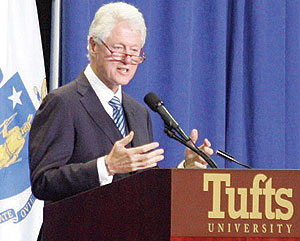
Former President Bill Clinton enlightened the audience at Tufts University with his views on a wide range of topics including the global economy and the domestic political scene. - Photo by Andrew Firestone
By Andrew Firestone
Tufts Students were granted an evening with a living legend last Sunday, November 6, when forty-second President William Jefferson Clinton arrived to give the tenth annual Issam M. Fares lecture. Last seen on the Tuft’s lecture platform in 2002, Clinton was quick on his feet, discussing international economics and the impact of macro-economic and social policy on the people of the world.
Clinton began by reminding the audience how far the country had come, and how much advancement existed, especially in terms of local business development and women’s rights throughout the world. He also took time to discuss various feats of science, including the proposed theory that the slight prevalence of positively charged particles over negative ones, or electrons in atoms gave rise to complex structure like life, and also that most of humanity has been revealed to be descended both between from Cro Magnon and Homo Neanderthals through the sequencing of the human genome.
“It did not surprise my wife and daughter to learn that I was part Neanderthal,” quipped Clinton. “They were, however, shocked to learn that they were too.”
He said that successful government always asks two questions: “What are you going to do, and how much money are we going to spend on it?”
“In large measure, you see that being debated in Washington today,” he said. “You want to spend more money on infrastructure to revive a sagging economy, or should we cut taxes again? If we cut taxes again, how much should we cut it and who gets what? “
He said that the most important question, and one that was often lose during debate, was “how?”
“How do you propose to do it, so you can target your good intentions into real changes in other people’s lives and foster positive interdependence?” he asked.
Clinton devoted most of his speech to describing his views on international political economics, using the example of developing affordable medicine for AIDs-stricken areas around the world, part of his foundation. Clinton detailed that, through changing the models of distribution, he was able to provide both affordable medicine for the needy, and also turn a profit for the previously under-demanded drug-companies.
“The whole price structure collapsed and all of my suppliers are making more money than they were before,” he said.
He expanded his ideas to include the current global financial crisis, which he viewed as a harbinger of reform. “I’m convinced that to deal with all of these problems in the end, including climate change, you have to find a way that’s good economics. You have to finally develop some sort of economic model even if it requires some kind of subsidies, that actually works,” he said.
“All systems basically get long in the tooth, like people,” he said regarding many institutions, particularly the educational system and the financial system. “The more successful they are, the more they create constituencies that are more interested in holding onto the present than create the future. Maintaining position, rather than advancing the purpose for which they were established in the first place. It’s endemic to human nature.”
He added that even the massive reform was “no big deal. It’s what people have always had to face.”
Clinton went in-depth concerning his desire to see change initiated for the better. His discourse ranged from the use of local businesses to foster sexual equality to Saudi Arabia, to the struggles of China and Brazil to balance a sound environmental policy in the wake of the dangerously high pollution and destruction brought upon by their developing markets.
“I don’t want to pretend these are easy questions,” he said, “but I know this: if your goal is to create a world of shared prosperity, shared responsibility and shared sense of community, to have people continually expanding the definition of ‘us’ and shrinking the definition of ‘them,’ you have to talk about these things.”
Of the current Democrat President, Clinton was very supportive. “It burns me up when people compare President Obama unfavorably with me in terms of working with Congress, because they’re comparing my last two years in office with his third year, and they’re forgetting that the real comparison is 1995, when we fought all year long, and Congress shut the government down twice,” he said.
He said that after the American people sided with him it became easier to prevent unnecessary discord, due to an “action forcing event” facilitating compromise.
Alderman At Large William White and Mayor Joseph Curtatone were at the lecture, with Clinton thanking Curtatone for hosting him in Somerville.















Reader Comments